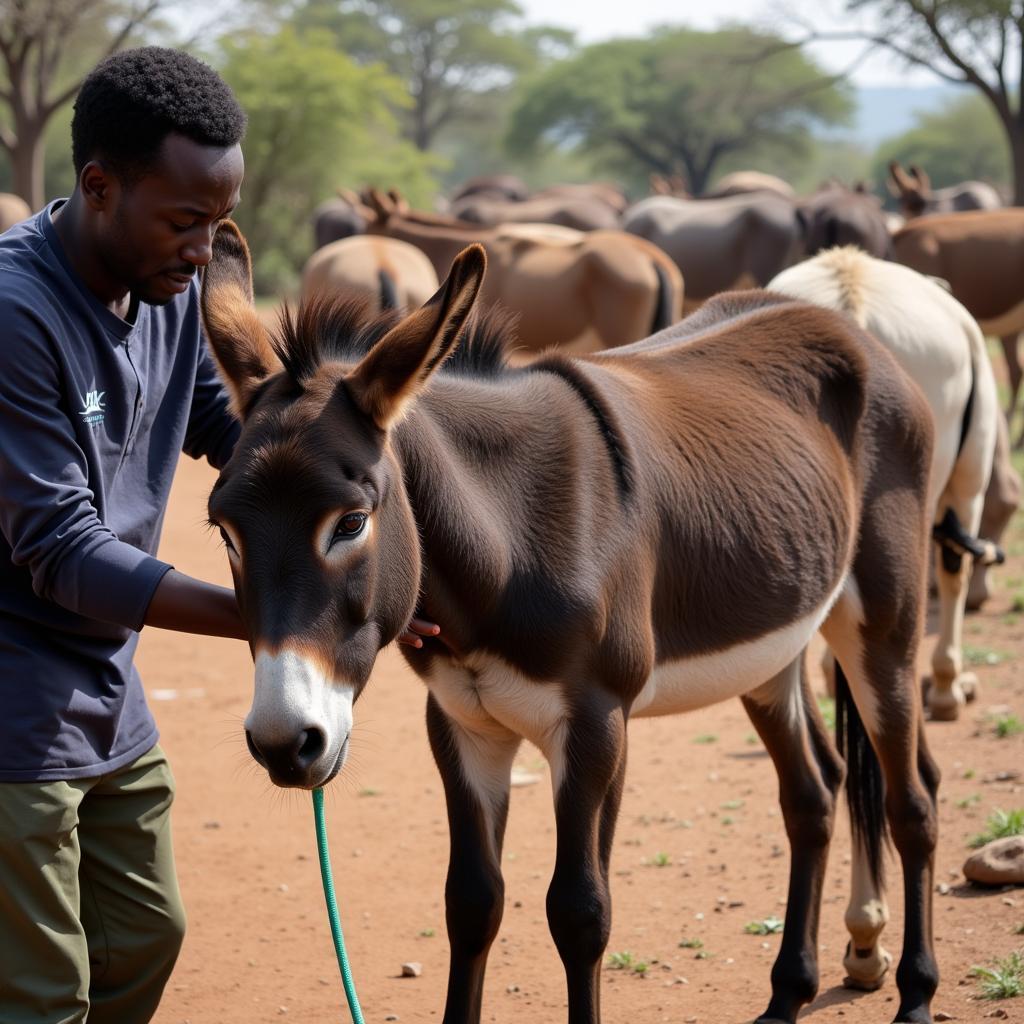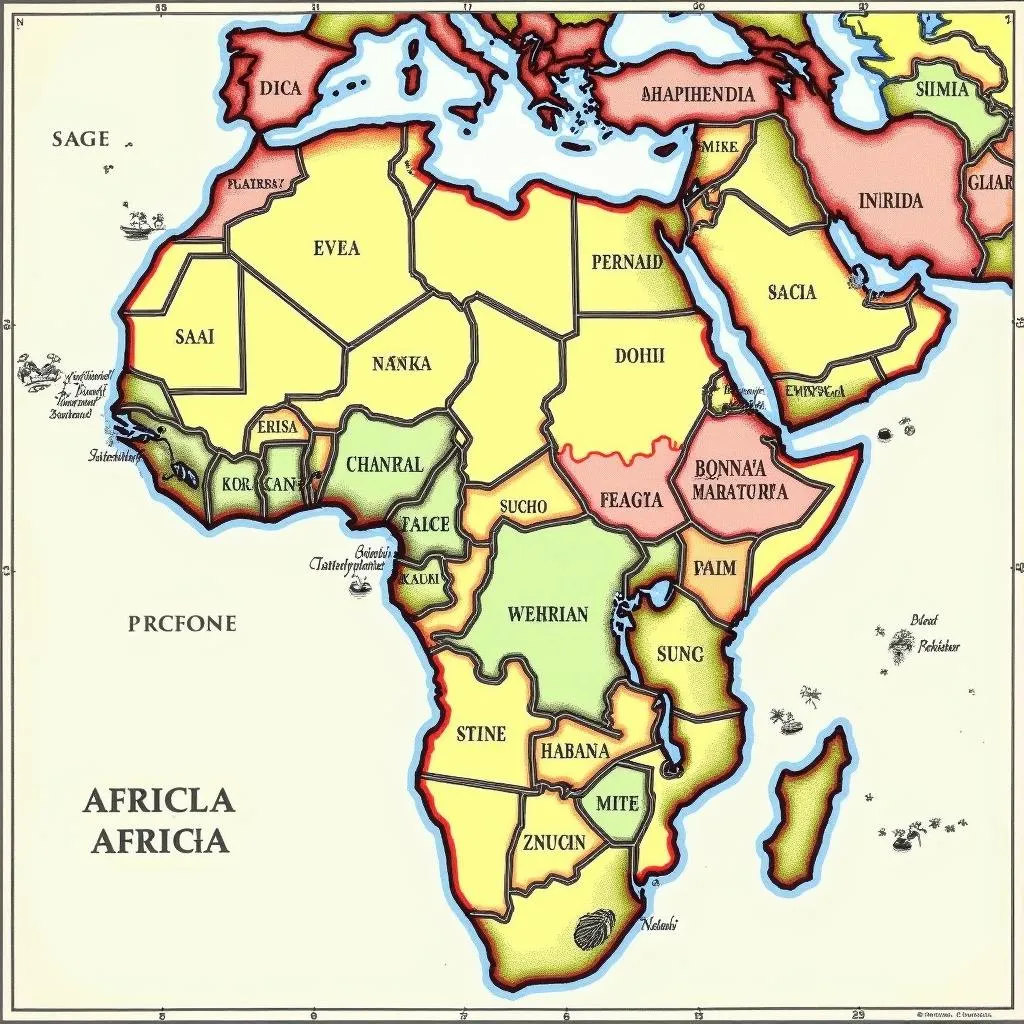Understanding African Donkey Mating
African Donkey Mating is a vital aspect of donkey husbandry across the continent. This natural process ensures the continuation of donkey populations, which play a crucial role in the livelihoods of many African communities. Understanding the intricacies of donkey reproduction is essential for successful breeding practices and maintaining healthy donkey populations. This article explores the various facets of African donkey mating, from the biological processes involved to the cultural significance of donkeys in different African societies.
The Biology of African Donkey Mating
Donkeys reach sexual maturity at different ages, with females typically ready to breed between 12 and 18 months, and males slightly later. The estrous cycle, or heat cycle, in female donkeys lasts approximately 21-30 days, with the receptive period lasting for several days within that cycle. During this period, the female exhibits various behavioral changes, including increased vocalization, tail raising, and frequent urination. Male donkeys, or jacks, are attracted to these signals and will initiate courtship behaviors such as sniffing, nudging, and braying.
The actual mating process involves the jack mounting the jenny (female donkey) and copulation. Successful mating leads to fertilization and ultimately, pregnancy. The gestation period in donkeys is approximately 12 months, after which a single foal is usually born.
Donkeys have adapted to the diverse climates and environments of Africa, and their breeding patterns may vary depending on factors like food availability and environmental conditions. In some regions, donkeys may breed year-round, while in others, breeding is more seasonal, coinciding with periods of abundant resources.
Recognizing Signs of Estrus in Donkeys
Identifying when a jenny is in heat is crucial for successful breeding. Apart from the behavioral changes mentioned earlier, physical signs such as swelling of the vulva and a clear mucous discharge can also indicate estrus. Experienced donkey owners can often accurately predict the optimal time for mating by observing these signs.
The Cultural Significance of Donkeys in Africa
Donkeys have been integral to African societies for centuries, serving as essential beasts of burden for transportation, farming, and other tasks. Their importance is reflected in various cultural practices and beliefs. In some communities, donkeys are considered symbols of wealth and prosperity, while in others, they are associated with resilience and hard work.
Dr. Anika Olumide, a renowned anthropologist specializing in African cultures, notes, “Donkeys are not merely animals in many African communities; they are interwoven into the fabric of daily life, representing strength, perseverance, and often, a vital connection to ancestral traditions.”
Donkey Husbandry Practices in Africa
Successful donkey breeding relies on sound husbandry practices. This includes providing adequate nutrition, healthcare, and suitable breeding environments. Careful selection of breeding pairs is also important to maintain desirable traits and improve the overall health and productivity of the donkey population.
Managing Donkey Breeding Programs
Structured breeding programs can help improve the genetic quality of donkeys and ensure the sustainability of donkey populations. These programs often involve careful record-keeping, health monitoring, and selective breeding based on desirable characteristics such as strength, endurance, and temperament.
Professor Kwame Asante, an expert in animal husbandry at the University of Ghana, states, “Effective donkey breeding programs are essential for preserving the valuable genetic resources of these animals and ensuring their continued contribution to the livelihoods of African communities.”
Conclusion
African donkey mating is a complex process that is both biologically fascinating and culturally significant. Understanding the intricacies of donkey reproduction, along with implementing sound husbandry practices, is crucial for maintaining healthy donkey populations and supporting the communities that rely on these resilient animals. Further research and education on donkey breeding can contribute significantly to the sustainable development of donkey husbandry across Africa.
FAQ
- When do donkeys reach sexual maturity? Donkeys typically reach sexual maturity between 12 and 18 months of age.
- How long is the gestation period in donkeys? The gestation period in donkeys is approximately 12 months.
- What are some signs that a jenny is in heat? Signs include increased vocalization, tail raising, frequent urination, swelling of the vulva, and a clear mucous discharge.
- What is the cultural significance of donkeys in Africa? Donkeys are integral to many African societies, serving as beasts of burden and holding symbolic meaning in various cultures.
- How can donkey breeding programs be improved? Structured programs with careful record-keeping, health monitoring, and selective breeding can enhance genetic quality and sustainability.
- What are some key aspects of donkey husbandry? Providing adequate nutrition, healthcare, and suitable breeding environments are essential for successful donkey husbandry.
- How does the environment impact donkey breeding patterns? Environmental factors like food availability and climate can influence the timing and frequency of donkey breeding.
 Donkey Husbandry Practices in Africa
Donkey Husbandry Practices in Africa
If you need further assistance, please contact us at Phone: +255768904061, Email: [email protected] or visit us at Mbarali DC Mawindi, Kangaga, Tanzania. We have a 24/7 customer service team.
